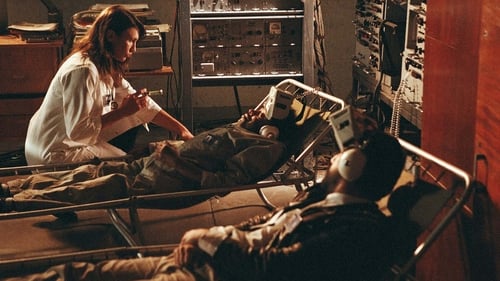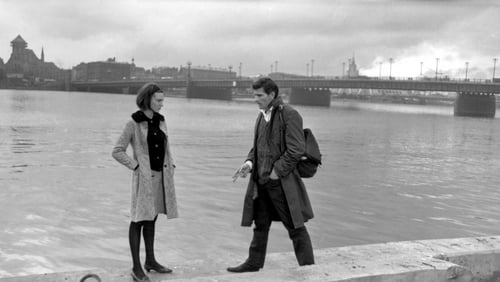Āris Rozentāls
Birth : 1938-04-06,
Death : 2019-01-03
History
Āris Rozentāls (born on April 6, 1938 in Liepāja - January 3, 2019) was a Latvian actor.
Studied at Liepāja 6th elementary school and Liepāja 1st secondary school . In 1960, he graduated from the Theater Faculty of the Latvian State Conservatory, majoring in acting. In 1981, he graduated from the Art History Department of the State Academy of Arts . As an actor, he worked in the Daugavpils Musical Drama Theater and the Liepāja Drama Theater . Since 1965, he was an actor in the Daile Theater

Jiminy
CIA agents Palmer and Gagano are tasked with the perilous mission of destroying “The Soviet Union!" As they enter the system using a VR simulation, their mission quickly turns into a delirious trap, far more complex than expected, as the fabric of reality starts unraveling around them. A cornucopia of stylistic influences, virtuosic cinematic techniques, and set design (ranging from stop-motion animation to stylized live-action), Llanso’s latest blends inter-dimensional intrigue, spy-fi, kung-fu, and Philip K. Dick-esque mind-melting weirdness to achieve truly unclassifiable results.

This time, in keeping with the best traditions of the first two parts, Mothers tells a beautiful, fascinating, lyrical and funny story of the three mothers that takes place in a small European town on New Year’s Eve. The three mothers are flying to Prague on New Year’s Eve.

The elderly nursing home residents for years feel worthless and troublesome. But then a crazy idea strikes them - to waive their pensions and enroll in the army as volunteers thus saving the country from financial crisis and spending excitingly the last years of their lives. The oldies are wise enough at organizing this event and now real adventures begin.

House Owner
A business executive lays off hundreds of harbor workers after they go on strike. He and his wife plan to escape the stress by taking an Italian vacation. On the evening before the trip, one of the fired workers, dressed in an orange harbor worker safety jacket, slips into their home. Although his immediate actions reveal a murderous intent, revenge is only the initial step.

An omnibus film consisting of ten parts, each directed by a different young director from the Latvian Academy of Culture. The unifying element of the ten shorts is the place where they take place - the airport. A lot can happen there - including a strike by a comet, a malicious attempt to break havoc by passengers, or an exploration of the old airport guard's house where not a lot has changed since the collapse of the Soviet Union. The film consists of the following parts: A Mishap (Nediena) by Arta Biseniece, Blurp (Šļurp) by Aija Bley, Alien Sky (Svešās debesis) by Viesturs Kairišs, 5 Versions (5 versijas) by Dzintars Krūmiņš, Comet (Komēta) by Māra Liniņa, Cleptomania (Kleptomānija) by Andis Mizišs, Alfredo's Poetry (Alfredo dzeja) by Igors Varenieks, Little Hand (Mazā roka) by Ilze Vidauska, Comet 2 (Komēta 2) by Anna Viduleja, and Life No. 2 (Dzīve nr.2) by Kristīne Želve.

(voice)
A white cat owns a mill, but loses the mill to a black cat and the devil. Latvian animation.

A homage to Krišjānis Barons and his life's work – to collect and catalogue Latvian folksongs or dainas,thus creating the encyclopaedia of Latvian life, a poetic reflection of the knowledge of life accumulated over the centuries. The film is based on Krišjānis Barons' life during late 1800s and early 1900s – his childhood and youth in Latvia, studies and work in St. Petersburg and other places in Russia, his relationship with his faithful wife Dārta, and the awakening of the Latvian self-awareness.


Cezars Kalnins, portrayed by "Latvian Harrison Ford” Uldis Pucitis, installs telephones by day and composes pop songs by night. The puritan Soviet censorship deems Cezars’s lyrics "unsuitable and frivolous” and "unfit for the Soviet youth”. In fact, it can be argued that this assessment matches the opinion of the Soviet cinema authorities in regard to this film as a whole, since "Four White Shirts” was immediately banned and released in cinemas only in 1986. The creative boldness and stubbornness, evident in both Cezars’s bitingly ironic verses and the film’s unconventional narrative structure and fresh, new-wave-inspired mode of expression, turned out to be equally problematic for the hero and for the film itself, as well as for its director whose representation of the actual mechanisms of Soviet censorship ended up too realistic for his own good.







